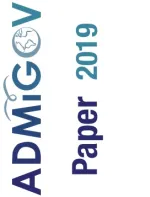An Overview of Migration Governance in Ethiopia

ADMIGOV (paper 2019)
The ADMiGOV project seeks to develop a definition of good migration governance that is grounded in data from fieldwork and is consistent with the New York Declaration and Sustainable Development Goals. This includes: i) following a bottom-up perspective centred on practices ii) being consistent with the complex multi-dimensional nature of migration governance, and iii) taking seriously the interests of migrants and countries of origin, considering the principles of protection and sustainable development. As such, an initial definition of migration governance is “a multilevel configuration of actors, relations, resources, policies and practices that regulate international migrations”.
Migration outcomes are shaped by these elements of governance (Pasetti, 2019). At the same time, these factors and outcomes can be seen as constantly interacting to steer the regulation of migration. One of the main challenges regarding migration governance is delineating which actors and policies are relevant to migration and how various actors and policies interact with non-migration policies to affect migration outcomes; migration trends may be influenced by various kinds of events and actions, such as economic policies or conflict. This background paper is structured by the aspects of migration governance highlighted in the definition above using the case study of Ethiopia. These analytical ‘building blocks’ are intended to form an accurate impression of the current state of migration governance in Ethiopia. It is noted, however, that migration governance is continually evolving, particularly in complex migration environments such as Ethiopia, and this paper therefore provides an overview of the situation in the spring of 2019. This background paper begins with migration outcomes, which provide a context for describing the migration policies, practices, and actors that govern the outcomes.